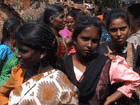|
|||||||
| français (original) | |
|||||||
www.alliance21.org
>
Workgroups
>
Thematic Groups
>
After Mumbai
|
|||||||
After MumbaiThe challenge of moving ahead towards a new phaseAdvances and tensions of the alternative world movement. Attempts to make the WSF genuinely global and develop it beyond its Brazilian roots have proved successful, since the quest to create truly global resistance and formulate alternative paths to capitalist globalisation aims at strengthening the combat of every actor, whether from the North, South, East or West. After Mumbai, Porto Alegre is even stronger. Thanks to the tenacity of the Indian organisers and above all to the strong presence and art of living of the Indians that gave life to this event, we are now stronger than before. That being said, several lessons stand out, among which are the following:
Several challenges for the future. 1. The visibility and legibility of debates and proposals The means for obtaining a global vision, to facilitate legibility sufficient to highlight the wealth of the debates and proposals, also remains a task on standby. Efforts have been made in the sectors of documentation and systematising the ideas formulated at the Forums since the first forum at Porto Alegre in January 2001. There is no nostalgia in this quest to keep archives on the forums. An amnesic movement is liable to become diluted, or else others will write its history. The work of archiving, documentation and systematisation is essential for emphasising the intercultural, social and political wealth contributed by the participants themselves. This effort permits proposing the new ideas and alternatives that social actors are implementing in order to respond to and overcome the policies dictated by the proponents of neo-liberal and neo-imperialist globalisation. 2. Historic and political challenges. Are we standing between the devil and the deep blue sea? Whereas the end of the Cold War and the fall of the Berlin Wall foretold of a new organization of the world, founded on international multilateralism based on law and democracy, we have been plunged into a completely different scenario. That of the undivided rule of the American Empire over the rest of the world. Neoliberal globalization is spreading its tentacles out unceasingly, reaching every last corner of the planet and doing nothing but aggravating inequalities between the rich and the poor, and between the North and the South. This early twenty-first century scenario—become even more explicit after the September 11, 2001 events—is marked by the passage from neoliberal globalization (in which the will for power was hindered by the Cold War) to neo-imperial globalization (in which the logic of war is added to the logic of competition, laying bare the interests of the United States and their allies). That being said, the current situation also has another singular feature that cannot be ignored, that of the strong growth in the number of spectacularly violent acts committed by groups operating in networks. We have got to the point where every year we commemorate terrorist attacks that have left several thousand dead. Henceforth we will live through an era in which every year is marked out by the anniversaries of massacres. This feature is specific to our era: the North American empire dictates but amidst explosions, as proved not only by those in Iraq but elsewhere in the Arab world, the big cities of the North and also certain cities in the South. Since this is the context in which we must situate ourselves, we must ask ourselves whether we are standing between the devil and deep blue sea? On the one hand, there is an empire that dictates its rationale of “pax Americana” through war and the social and political organisation that it comprises and, on the other hand, there are groups that organise repeated terrorist attacks and organised Mafia type networks that operate clandestinely and determine the lives of millions of human beings who survive in conditions of slavery. Given this rationale (the term is debatable), the civil society now emerging and that we are seeking to develop must avoid becoming a hostage. Naturally, we have progressed since the fall of the Berlin Wall and apartheid in South Africa. New values have been brought to the fore, a new relationship between humanity and the biosphere has been formulated, and relations of respect between men and women have been emphasised. During the last decade we have made progress on human rights. We even believed that Pinochet was going to be judged at one point! The International Criminal Court is now a reality. Large networks have developed, hundreds of meetings have been organised and dozens of proposal papers have been produced. The twenty-first century will have to be one of great transformations. Changes in our way of thinking, feeling, producing, consuming, being together, and governing ourselves. Every man and woman knows this but feels overwhelmed by his or her helplessness and isolation. It is against this helplessness that we need to react and this reaction is coming from all over the world in many forms. To overcome this challenge, social forums and different civic movements in many regions of the world have launched wide-ranging debate on ideas and proposals. They can and must not only provide answers to these questions but also contribute towards immediately opening up new perspectives so that humanity can live in peace. This challenge has now become a question of life or death. Download the complete text (with notes): |

|

